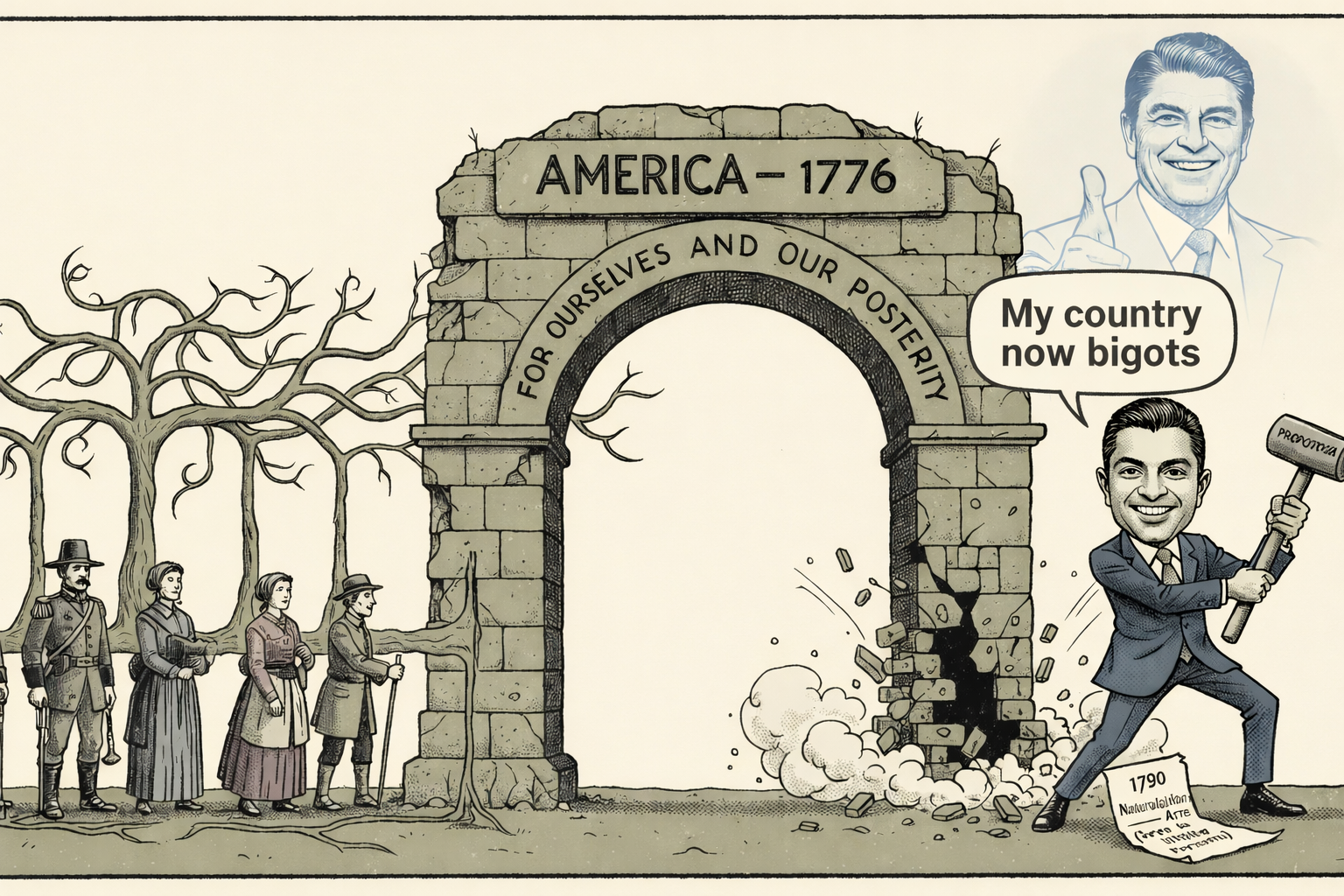by ThinkingWest
In recent years angry protesters across the United States have toppled several statues depicting historical figures from America’s past. Much of this anger is driven by outrage at the atrocities in which these historical figures were involved. Unfortunately, much of this anger has been targeted at individuals whose contribution to American history isn’t completely negative in the eyes of the majority of Americans. Even several likenesses of the Founding Fathers have been toppled at the whim of some vehement mob1,2.
Discourse in many intellectual circles regarding the Founding Fathers has devolved from critique to outright condemnation over the last few decades. This condemnation generally springs from the fact that some of the Founding Fathers were slave owners and that slavery was prevalent in the early United States. Some scholars even make the argument that the United States was truly founded when the first African slaves were brought to the New World3.
But is it fair to completely condemn the founders of our nation for participating in an institution that pre-existed their own births? Should we discard all of the contributions of the founders because they owned slaves and lived in a society where slavery was legal? More generally, how should we evaluate historical figures that made meaningful, positive contributions but often behaved in immoral ways and participated in common societal practices we now deem despicable? Our aim is neither blind damnation or veneration of any individual in question. Instead, it is to paint a fair, historically accurate depiction of the person and to carefully evaluate their lasting effects on history. After all, history is about people, and people are complex, not merely one-dimensional, cartoonish heroes and villains.
The Common and The Uncommon Act
One model by which we can begin to judge historical figures is by considering what actions and behaviors the individual committed that were common to the time in which they lived and which actions were uncommon to their time. After all, it is de facto the uncommon acts an individual carries out that make them an historical figure. For instance, in the cases of Thomas Jefferson and George Washington, owning slaves was common amongst the wealthy colonists during America’s founding. However, there is only one author of the Declaration Independence and only one first President of the United States. Toppling statues of Jefferson and Washington to protest against their ownership of slaves is to mistake, or perhaps intentionally distort, the true reason why statues of Jefferson and Washington exist in the first place: these statues do not exist because they were slave owners, but because they were Founding Fathers and early Presidents of the American republic.

We can apply the same method to evaluate figures we agree contributed negatively to history as well. For example, a number of tyrannical dictators had qualities which at face value we agree to be healthy and admirable in a person. Loving dogs4, consciously eating5, and having a love for the arts6,7 are all generally viewed as positive traits in someone. However, these traits are common and not at all the reason we learn about Hitler and Stalin in history class. We study Hitler and Stalin in order to learn valuable lessons about how to prevent and combat tyranny because of the unforgivable atrocities these men committed.
The Moral Arc
The Moral Arc is referred to in an often paraphrased quote, and a personal favorite of Martin Luther King Jr, by 19th century unitarian minister Theodore Parker:
“Look at the facts of the world. You see a continual and progressive triumph of the right. I do not pretend to understand the moral universe, the arc is a long one, my eye reaches but little ways. I cannot calculate the curve and complete the figure by the experience of sight; I can divine it by conscience. But from what I see I am sure it bends towards justice. Things refuse to be mismanaged long. Jefferson trembled when he thought of slavery and remembered that God is just. Ere long all America will tremble.”8.
Theodore Parker
Parker’s quote confidently conveys a sense that despite temporary moral failures and setbacks, humanity proceeds on a path that ultimately leads to a more just and righteous world. However, the Moral Arc is not a strictly defined concept. In fact it’s an explicitly vague and nebulous concept which is defined subjectively and while Parker might suggest that the trajectory towards justice has been the norm over the past few centuries, we should not mistake that with the belief that such a trajectory is inevitable independent of human action. Though humans are inherently subjective and cannot escape this subjectivity when making judgements about the past, a line must be drawn in order to determine what is good and what is bad in order to judge history at all. Thus, an individual or society must have a formulation of what constitutes justice. We will refer to this formulation of justice and the Moral Arc.
Once we have extracted out the rare achievements or actions of a historical figure we may consider what effect these actions had on the Moral Arc. Did these actions bend towards or away from justice? In the case of Washington and Jefferson, their unique contributions to history resulted in the founding of a new nation, the proliferation of ideas of liberty, the equal value of all citizens under the law, and the implementation of a legal framework based on English common law. The combination of these would eventually lead to the emancipation of slaves and the political enfranchisement of women and minorities. While these men owned slaves and lived in a world which did not recognize women as full citizens, these moral shortcomings are not unique to them. The early colonies had many slave owners who failed to contribute the slightest to the founding of the United States. And so, their names are dust.
A Thought Experiment for Critics

Let’s now consider a thought experiment to demonstrate why it might be reasonable to adopt the proposed model. Imagine it’s two hundred years into the future. The year is 2223 and humanity has flourished beyond our wildest imagination. The resource constraints and concerns of today are long forgotten as man, through science and engineering, has bent nature to his will and largely rid himself of our mundane daily concerns for food, shelter, and warmth, even to a greater extent than we have been able to achieve relative to our prehistoric ancestors.
Long forgotten are the days when man needed to raise, farm, and kill animals for the consumption of meat. Additionally, mankind no longer needs to burn fossil fuels to generate the energy to power its growing civilization. In fact, these practices are now illegal and viewed as barbaric. Would we want the great individuals and their of our time to be forgotten and even demonized simply because they ate steak and drove cars with internal combustion engines? Even when their achievement had nothing to do with eating meat or burning fossil fuels? Clearly, we would not wish for the great individuals of our time to be judged so harshly because they participated in common social norms of their time.
A proper understanding of history does not blame great people for participating in the social norms of their time because social norms evolve over time. Instead, it seeks to understand the unique context of these social norms and celebrates the progress we have made along the winding Moral Arc.
Final Thoughts
The attempt here is to provide a reasoned, logical, even formulaic (likely to a fault) method of judging historical individuals’ contributions and their lasting effects on history. This author suffers no delusions that a reasoned approach such as posited in this article will be adopted by statue-toppling vandals. Therefore, this article is directed not towards those monument defacing delinquents, but towards those ivory tower academics and intellectuals whose soured ideas trickle down to the masses below like a toxic sludge. The academicians who embrace the full condemnation of historical figures without consideration of the times in which those figures lived abandon their responsibility as scholars by adopting naïve, simplistic, and biased worldviews. Future scholarship should seek to properly appreciate the unique times in which many historical figures lived and to understand the complexities of these historical personalities. Such blind condemnation may one day be applied to our own time at the expense of many of recent history’s greatest achievements and the individuals who facilitated those achievements.

Thinking West aims to revive the “Great Conversation” in our digital age through promoting the study of the great books of the western world, classical approaches to education, and through thoughtful commentary on current events, history, philosophy, culture, education, and religion.
We strive first and foremost to spark an appreciation for the values that built the West. Our content strives for depth and meaning in an era plagued by six second attention spans and clickbait headlines. We challenge ourselves and our readers to read, reflect, and speak out on ideas that matter.
Footnotes:
1.) https://www.opb.org/news/article/george-washington-statue-toppled-portland/
4.) https://en.wikipedia.org/wiki/Blondi
5.) https://en.wikipedia.org/wiki/Adolf_Hitler_and_vegetarianism
6.) https://en.wikipedia.org/wiki/Paintings_by_Adolf_Hitler
7.) https://en.wikipedia.org/wiki/Joseph_Stalin#Personality
8.) https://quoteinvestigator.com/2012/11/15/arc-of-universe/





